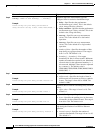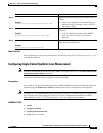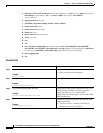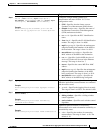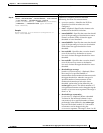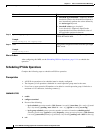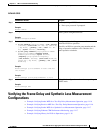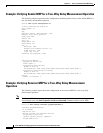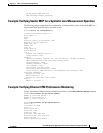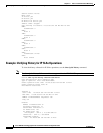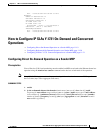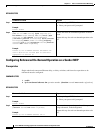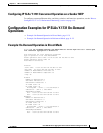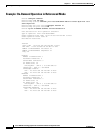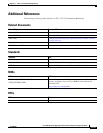
11-16
Cisco ASR 901 Series Aggregation Services Router Software Configuration Guide
OL-23826-09
Chapter 11 ITU-T Y.1731 Performance Monitoring
Verifying the Frame Delay and Synthetic Loss Measurement Configurations
Example: Verifying Sender MEP for a Two-Way Delay Measurement Operation
The following sample output shows the configuration, including default values, of the sender MEP for a
two-way delay measurement operation:
Router# show ip sla configuration 10
IP SLAs Infrastructure Engine-III
Entry number: 10
Owner:
Tag:
Operation timeout (milliseconds): 5000
Ethernet Y1731 Delay Operation
Frame Type: DMM
Domain: xxx
Vlan: yyy
Target Mpid: 101
Source Mpid: 100
CoS: 4
Max Delay: 5000
Request size (Padding portion): 64
Frame Interval: 1000
Clock: Not In Sync
Threshold (milliseconds): 5000
.
.
.
Statistics Parameters
Aggregation Period: 900
Frame offset: 1
Distribution Delay Two-Way:
Number of Bins 10
Bin Boundaries: 5000,10000,15000,20000,25000,30000,35000,40000,45000,-1
Distribution Delay-Variation Two-Way:
Number of Bins 10
Bin Boundaries: 5000,10000,15000,20000,25000,30000,35000,40000,45000,-1
History
Number of intervals: 2
Example: Verifying Receiver MEP for a Two-Way Delay Measurement
Operation
The following sample output shows the configuration of the receiver MEP for a two-way delay
measurement operation:
Note The Cisco ASR 901 router supports hardware-based timestamping. Enable the hardware-based
timestamping using the dmm responder hardware timestamp command on the receiver MEP.
Router-1# show running interface gigabitethernet0/0
interface GigabitEthernet0/0
no ip address
negotiation auto
service instance 1310 ethernet ssvc1310
encapsulation dot1q 1310
rewrite ingress tag pop 1 symmetric
bridge-domain 1310



